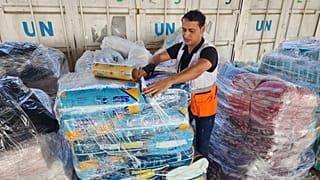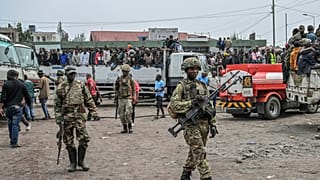Democratic Republic Of Congo
Inside a health center in Goma, Democratic Republic of Congo, medical teams are working hard to identify monkeypox patients as the number of cases in the city continues to rise by the day.
The World Health Organization declared the mpox outbreaks in Congo and elsewhere in Africa a global emergency on Wednesday, with cases confirmed among children and adults in more than a dozen countries and a new form of the virus spreading.
Earlier this week, the Africa Centers for Disease Control and Prevention announced that the mpox outbreaks were a public health emergency, with more than 500 deaths, and called for international help to stop the virus’ spread.
“From Friday (9 August) to today, we're up to nine confirmed cases of monkey pox. People who come with suspicious lesions, we isolate them first, then take the sample.”, Dr. Rachel Maguru, General Practitioner at Goma Provincial Hospital and Head of the Multi-Epidemic Center, said.
Dr Maguru noted that the medical staff were worried those with symptoms could refrain from coming to the hospital as the infected are taken into isolation.
"This is what can lead to a cascade of infection because they will remain in their environment,” she said.
Earlier this year, scientists reported the emergence of a new form of the deadlier form of mpox, which can kill up to 10% of people, in a Congolese mining town that they feared might spread more easily. Mpox mostly spreads via close contact with infected people, including through sex.
Unlike in previous mpox outbreaks, where lesions were mostly seen on the chest, hands and feet, the new form causes milder symptoms and lesions on the genitals. That makes it harder to spot, meaning people might also sicken others without knowing they’re infected.
“We have a large number of cases. The cases are increasing. The mortality rate is higher than we would tolerate. And then the thought is that new countries are now starting to report cases. So these are countries that didn't have cases in the last few years and now reporting cases. And several of them are reporting cases of the variant of mpox that is just being spread in the DRC”, said Prof. Salim Abdool Karim, chair of the Emergency Consultative Group for the Africa Centers for Disease Control and Prevention.












00:10
Sierra Leone declares end of Mpox outbreak but survivors face discrimination
00:24
DR Congo: is Katanga the next target for M23 rebels?
02:07
Fear and uncertainty grip Uvira after M23 seizes strategic city
01:00
Pix of the Day: December 5, 2025
00:57
Trump to host DRC and Rwanda presidents to sign peace agreement
01:07
Congolese authorities declare end of Ebola outbreak in Kasai